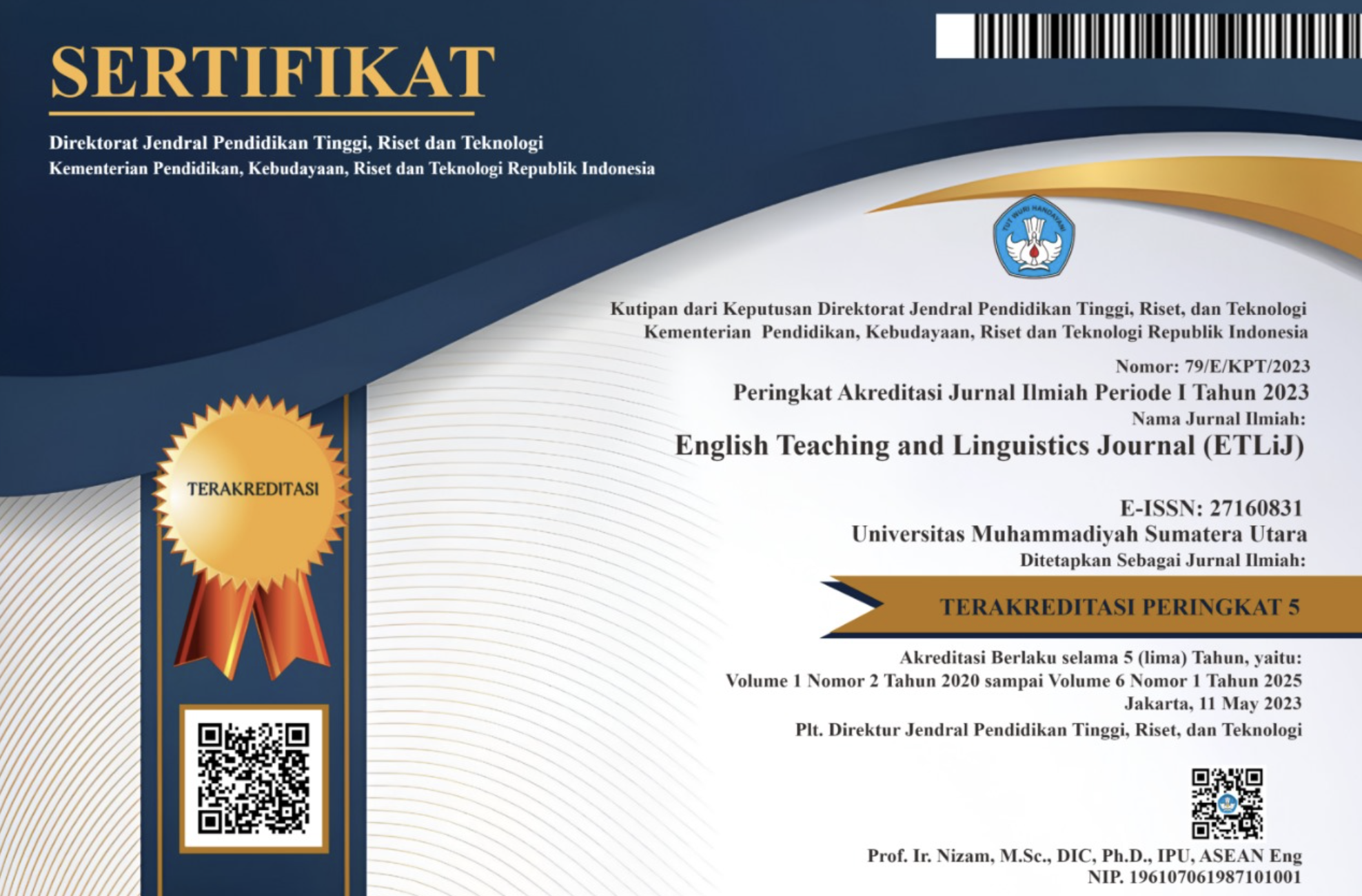The Use of Quantum Teaching in Teaching English at Al-Manar Islamic Boarding School
Abstract
This research explores the effectiveness of Quantum Teaching in enhancing the English teaching and learning process, particularly in making it more engaging and enjoyable for students. The research was conducted at Al-Manar Islamic Boarding School in Aceh Besar, where the traditional English learning methods were often perceived as boring and failed to maintain students' motivation. This study specifically focused on junior high school students, who frequently experience low motivation, which affects their English mastery and achievement. The aim was to determine whether the use of Quantum Teaching could improve students’ interest, motivation, and comprehension in learning English. The research concentrated on the reading comprehension subject for second-grade students, as it is a core area where Quantum Teaching could be effectively applied. The findings of the study indicated that Quantum Teaching significantly improved the learning atmosphere and students' involvement in the learning process. The evidence was drawn from both pre-test and post-test scores, showing a substantial improvement in student performance. Additionally, teaching methods such as using music during recount text lessons and conducting descriptive text lessons outside the classroom were found to be particularly effective. The study was further supported by student responses through questionnaires, which confirmed that Quantum Teaching increased their interest and motivation. In conclusion, the use of Quantum Teaching proved to be a successful method to improve English learning outcomes.
Full Text:
PDFReferences
Bjorklund, D. F., & Causey, K. B. (2017). Children's thinking: Cognitive development and individual differences (6th ed.). SAGE. https://doi.org/10.4135/9781071802779
Cohen, L, Manion, L, & Morrison, K. (2018). Research Methods in Education (8th ed.). Routledge.
Creswell, J. W. , & Creswell, J. D. (2023). Research design: Qualitative, quantitative, and mixed methods approaches (6th ed.). SAGE Publications.
DePorter, B., & Hernacki, M. (2021). Quantum learning: Unleashing the genius in you. EdPro.
Dörnyei, Z. (2020). Innovations and challenges in language learning motivation. Routledge.
Freeman, S., et al. (2014). Active learning increases student performance in science, engineering, and mathematics. Proceedings of the National Academy of Sciences, 111(23), 8410- 8415. https://doi.org/10.1073/pnas.1319030111
Jensen, E. (2020). Brain-based learning (4th ed.). Corwin.
Mayer, R. E. (2021). Multimedia learning (3rd ed.). Cambridge University Press.
Nurhidayah, I. J., Rasyid, Y., & Anugerahwati, M. (2021). Quantum Teaching in EFL reading. JEES (Journal of English Educators Society), 6(1), 1-8. https://doi.org/10.21070/jees.v6i1.1023
Palinkas, L. A., Horwitz, S. M., Green, C. A., Wisdom, J. P., Duan, N., & Hoagwood, K. (2015). Purposeful sampling for qualitative data collection and analysis in mixed method implementation research. Administration and Policy in Mental Health and Mental Health Services Research, 42(5), 533–544.
Patton, M. Q. (2015). Qualitative research & evaluation methods: Integrating theory and practice (4th ed.). SAGE Publications.
Purnama, S. G., Suparno, S., & Ashadi, A. (2022). Quantum Teaching impacts on language skills. International Journal of Instruction, 15(1), 347-364. https://doi.org/10.29333/iji.2022.15120a
Rahmawati, Y., et al. (2022). Quantum Teaching in urban Indonesian schools. TEFLIN Journal, 33(1), 78-95. https://doi.org/10.15639/teflinjournal.v33i1/78-95
Richards, J. C. (2023). Approaches and methods in language teaching (4th ed.). Cambridge University Press.
Schunk, D. H., & DiBenedetto, M. K. (2020). Motivation and social cognitive theory. Contemporary Educational Psychology, 60, 101832. https://doi.org/10.1016/j.cedpsych.2019.101832
Sousa, D. A. (2022). How the brain learns (6th ed.). Corwin.
Theobald, E. J., et al. (2020). Active learning narrows achievement gaps. PNAS, 117(12), 6476- 6483. https://doi.org/10.1073/pnas.1916903117
Tokuhama-Espinosa, T. (2021). Neuromyths: Debunking false ideas about the brain. W.W. Norton.
Wang, M.-T., et al. (2021). Classroom climate and children's academic and psychological wellbeing. Journal of Educational Psychology, 113(6), 1174-1186. https://doi.org/10.1037/edu0000629
Widodo, H. P. (2020). Methodological innovations in language education research. System, 93, 102305. https://doi.org/10.1016/j.system.2020.102305
Zainuddin, Z., et al. (2020). The role of gamified e-quizzes on student learning. Computers & Education, 145, 103729. https://doi.org/10.1016/j.compedu.2019.103729
DOI: https://doi.org/10.30596/etlij.v6i2.24892
Refbacks
- There are currently no refbacks.

This work is licensed under a Creative Commons Attribution 3.0 License
ISSN: 2716-0831





